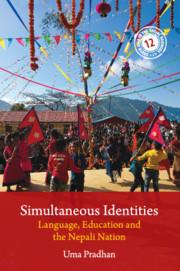Book contents
- Frontmatter
- Contents
- List of Figures
- List of Tables
- List of Appendices
- List of Abbreviations
- Acknowledgements
- Notes on the Use of Terms, Transliteration and Names
- Introduction: Language, Education and the Nepali Nation 1
- 1 Language, Education and State-Making in Nepal
- 2 Mother Tongue and the Construction of an Educated Person
- 3 Language, Public Space and Identity
- 4 Transforming Language to a Script
- 5 Language, Education and Knowledge-Making
- 6 Quality, Equality and Language Ideology
- 7 Ethnicity, Education and Employment
- Conclusion: Simultaneous Identities
- Appendices
- Glossary
- Bibliography
- Index
2 - Mother Tongue and the Construction of an Educated Person
Published online by Cambridge University Press: 30 April 2020
- Frontmatter
- Contents
- List of Figures
- List of Tables
- List of Appendices
- List of Abbreviations
- Acknowledgements
- Notes on the Use of Terms, Transliteration and Names
- Introduction: Language, Education and the Nepali Nation 1
- 1 Language, Education and State-Making in Nepal
- 2 Mother Tongue and the Construction of an Educated Person
- 3 Language, Public Space and Identity
- 4 Transforming Language to a Script
- 5 Language, Education and Knowledge-Making
- 6 Quality, Equality and Language Ideology
- 7 Ethnicity, Education and Employment
- Conclusion: Simultaneous Identities
- Appendices
- Glossary
- Bibliography
- Index
Summary
An idea of an ‘educated person’ (padhe lekheko manchhe) in Nepal, as discussed in the previous chapter, is the result of a socio-historical process. The Nepali term padhe lekheko manche, that is, an educated person is composed of two terms padhne (to read) and lekhne (to write). An ‘educated person’ in Nepali, therefore, literally means a person who can read and write, both referring to the literacy skills. Given that the census of Nepal until 1981 defined ‘literate’ as only those who could read and write in Nepali, the idea of ‘educated person’ was pivoted around the competence of and literacy in Nepali language. With this centrality of national language, mass schooling gradually began to occupy a central role in social and cultural shaping of the young for the production of an ‘educated person’ in Nepal.
In this context, the use of mother tongues in education was also about articulating new ideas about what it means to become an ‘educated person’ in one's mother tongue. An educated person, according to Levinson, Foley and Holland (1996), is a valued social identity. This identity serves to assure people that one possesses the valued disposition or symbolic capital, including a particular kind of knowledge and language competence that is required to position oneself well in social hierarchy, a way to claim distinction from other groups. Mastery over the dominant language, which is authorised by the nation-state, market and other institutions, is one of the important ways in which an educated person is socially constructed. Valentin (2005: 156), in her research on education in squatter settlements of Nepal, notes that the qualities ascribed to a ‘schooled person’ (padheko manche) are believed to be obtained through school education. In addition to other qualities such as disciplined behaviour and respectable conduct, one of the most valued outcome of schooling is ‘being able to read and write’.
The focus on the idea of production of an ‘educated person’ helps us to appreciate the cultural processes of how one becomes a fully knowledgeable person embodying a maximum symbolic capital, within and against larger societal forces and structures operating in schools, in order to position oneself well in social hierarchy and ‘become somebody’ (Levinson, Foley and Holland, 1996; Luttrell, 1996).
- Type
- Chapter
- Information
- Simultaneous IdentitiesLanguage, Education, and the Nepali Nation, pp. 67 - 91Publisher: Cambridge University PressPrint publication year: 2020

